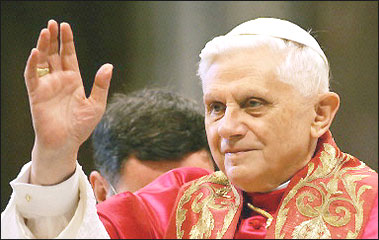|
"Numerous
Occupations Lead to "Hardness of Heart"
VATICAN CITY, AUG. 20, 2006 (Zenit.org).- Here is a translation of the address Benedict XVI gave today before praying the midday Angelus with thousands gathered in the courtyard of the summer papal residence of Castel Gandolfo.
Dear Brothers and Sisters:
Among the saints of the day, the calendar mentions today St. Bernard of Clairvaux, great doctor of the Church, who lived between the 11th and 12th centuries (1091-1153). His example and teachings appear particularly useful also in our time.
Having left the world after a period of intense interior turmoil, he was elected abbot of the Cistercian monastery of Clairvaux at 25 years of age, remaining at its head for 38 years, until his death.
His dedication to silence and contemplation did not prevent him from carrying out an intense apostolic activity. He was also exemplary in his commitment to overcome his impetuous temperament, as well as in his humility in being able to acknowledge his limitations and faults.
The wealth and value of his theology are not owed only to his opening new avenues, but rather on his having succeeded in proposing the truths of faith with a clear and incisive style, able to fascinate those who hear him and to dispose the spirit to recollection and prayer.
In each of his writings the echo is perceived of a rich interior experience, which he succeeded in communicating to others with an amazing capacity of persuasion.
For him, love is the greatest force of the spiritual life. God, who is love, creates man out of love and out of love rescues him. The salvation of all human beings, mortally wounded by original sin and burdened with personal sins, consists in adhering firmly to divine charity, which was fully revealed to us in Christ crucified and risen.
In his love, God heals our will and sick intelligence, raising them to the highest level of union with him, namely, to holiness and mystical union.
St. Bernard speaks of this among other things in his brief but consistent "Liber de diligendo Deo" (Book on the Love of God). He has another writing that I would like to point out, the "De Consideratione," a brief document addressed to Pope Eugene III. The dominant theme of this book, extremely personal, is the importance of interior recollection -- and he said this to a Pope -- an essential element of piety.
It is necessary to pay attention to the dangers of excessive activity, regardless of one's condition and occupation, observes the saint, because -- as he said to the Pope of that time, and to all Popes and to all of us -- numerous occupations often lead to "hardness of heart," "they are no more than suffering for the spirit, loss of intelligence and dispersion of grace" (II, 3).
This admonition is valid for all kinds of occupations, including those inherent to the governance of the Church. The message that, in this connection, Bernard addresses to the Pontiff, who had been his disciple at Clairvaux, is provocative: "See where these accursed occupations can lead you, if you continue to lose yourself in them -- without leaving anything of yourself for yourself" (ibid).
How useful for us also is this call to the primacy of prayer! May St. Bernard, who was able to harmonize the monk's aspiration for solitude and the tranquility of the cloister with the urgency of important and complex missions in the service of the Church, help us to concretize it in our lives, in our circumstances and possibilities.
We entrust this difficult desire to find a balance between interiority and necessary work to the intercession of the Virgin, whom he loved from his childhood with tender and filial devotion, to the point of meriting the title of "Marian Doctor."
Let us invoke her so that she will obtain authentic and lasting peace for the whole world. In a famous address, St. Bernard compares Mary with the star that seafarers look to so as not to lose their way.
He wrote these famous words: "Whoever you are that perceive yourself during this mortal existence to be rather drifting in treacherous waters, at the mercy of the winds and the waves, than walking on firm ground, turn not away your eyes from the splendor of this guiding star, unless thou wish to be submerged by the storm. ... Look at the star, call upon Mary. ... With her for guide, you shall not go astray, while invoking her, you shall never lose heart ... if she walks before you, you shall not grow weary; if she shows you favor, you shall reach the goal," ("Homilia super Missus est," II, 17).
[At the end of the Angelus the Pope greeted pilgrims in six languages. In English, he said:]
I am happy to greet all the English-speaking pilgrims and visitors present for this Sunday Angelus. In today's Gospel Jesus reveals himself as the bread of life, who comes down from heaven.
May our celebration of the Lord's Day be always a time of joyful thanksgiving for the gift of new life in Christ! I wish you all a pleasant stay in Castel Gandolfo and Rome, and a blessed Sunday!
|
